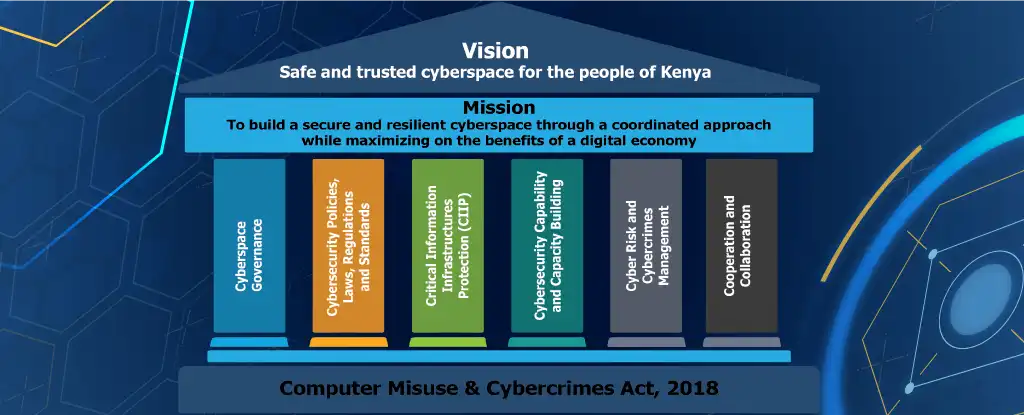In today’s digital age, cybersecurity is no longer an option—it is a necessity. As Kenya rapidly embraces digital transformation, from mobile banking to e-government services, the country is more connected than ever before. However, this connectivity comes with rising threats that cannot be ignored.
The Growing Digital Economy in Kenya
Kenya has become a hub of innovation with platforms like M-Pesa, online businesses, e-learning systems, and digital government services. Millions of Kenyans now rely on the internet for financial transactions, communication, and shopping. This growth drives convenience and economic expansion but also opens doors to cybercrime.
The more Kenya digitizes, the more sensitive information gets stored online. From health records and school data to business contracts and banking details, valuable information is constantly at risk if not protected.
Rising Cybercrime Threats
According to recent reports from the Communications Authority of Kenya, the country records millions of cyberattack attempts every year. Threats such as phishing scams, malware, ransomware attacks, and identity theft are on the rise
- Phishing: Fraudsters trick users into sharing sensitive information like passwords.
- Ransomware: Hackers lock data and demand payment to release it.
- Data breaches: Personal and business information is stolen and sold on the dark web.
These threats not only affect large organizations but also ordinary Kenyans using smartphones for daily activities.
Impact on Businesses and Individuals
The impact of cybercrime is devastating. For businesses, a single data breach can mean:
- Loss of customer trust
- Heavy financial losses
- Damage to brand reputation
- Possible legal consequences
For individuals, stolen information can lead to:
- Unauthorized bank withdrawals
- Compromised social media accounts
- Identity theft used in fraud cases
In short, no one is safe unless proper cybersecurity measures are in place.
Government and Policy Response
The Kenyan government has recognized the threat and taken steps to improve digital safety. The Computer Misuse and Cybercrimes Act was introduced to provide legal backing against cybercriminals. Additionally, the government has developed national cybersecurity strategies to protect critical infrastructure like airports, banks, and government databases.
However, enforcement remains a challenge. Cybercriminals are becoming more advanced, and laws must evolve quickly to keep up. Stronger collaboration between the government, private sector, and international partners is needed.
Importance of Cybersecurity Awareness
Technology alone cannot win the fight against cybercrime. Human error remains the biggest weakness. Most attacks succeed because users fall for scams, click unsafe links, or use weak passwords.
To reduce risks, there must be widespread cybersecurity awareness campaigns. Citizens should be trained on:
- Creating strong passwords
- Enabling two-factor authentication
- Avoiding suspicious links and attachments
- Updating software and apps regularly
With proper awareness, Kenyans can become the first line of defense against cyber threats.


The Business Case for Strong Cybersecurity
Investing in cybersecurity is not just about protection—it is also about growth. Companies that demonstrate strong data protection practices earn customer trust and attract global partners. For Kenya to continue being a leading digital hub in Africa, businesses must prioritize cybersecurity budgets and integrate security into their daily operations.
Small and medium enterprises (SMEs), which make up a large portion of Kenya’s economy, are particularly vulnerable. Many lack the resources to invest in advanced systems, making them easy targets. Affordable and scalable solutions must be developed for this group.
Cybersecurity and Kenya’s Future
Kenya’s vision of becoming a digital economy leader depends heavily on cybersecurity. With the rise of artificial intelligence (AI), Internet of Things (IoT), and 5G technology, the attack surface will only expand. A secure digital environment will encourage innovation, attract foreign investment, and protect citizens.
Cybersecurity must therefore be viewed as a shared responsibility. From government institutions and private companies to schools and individuals, everyone has a role to play.

Conclusion
Cybersecurity is no longer just a technical concern—it is a national priority. As Kenya continues to advance digitally, the risks of cybercrime will only increase. Protecting data, businesses, and individuals requires awareness, collaboration, and investment in security measures. By making cybersecurity a collective responsibility, Kenya can safeguard its digital future and build a more resilient economy.



